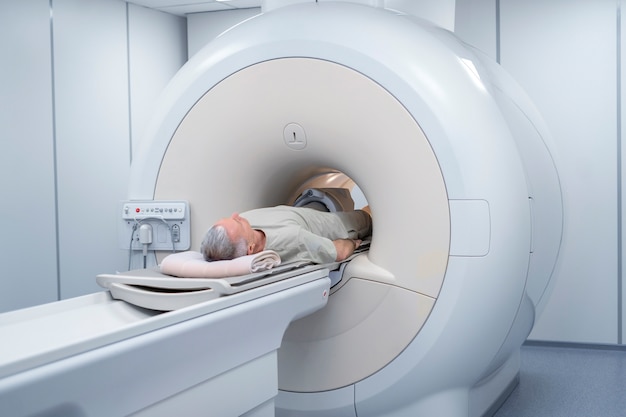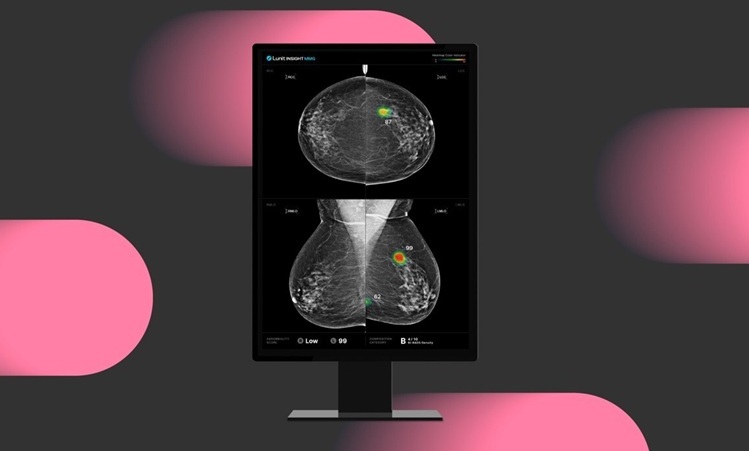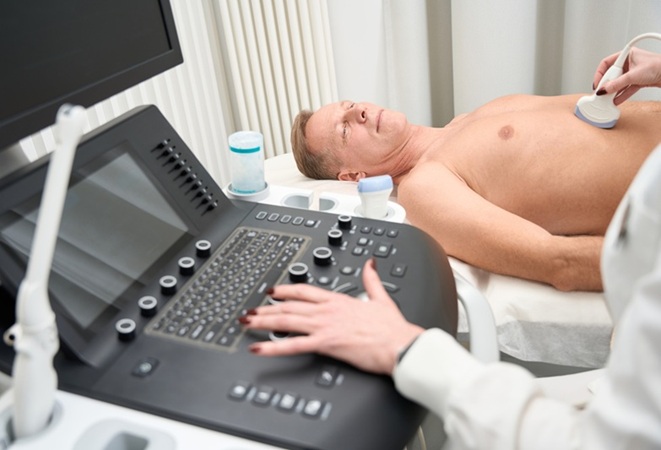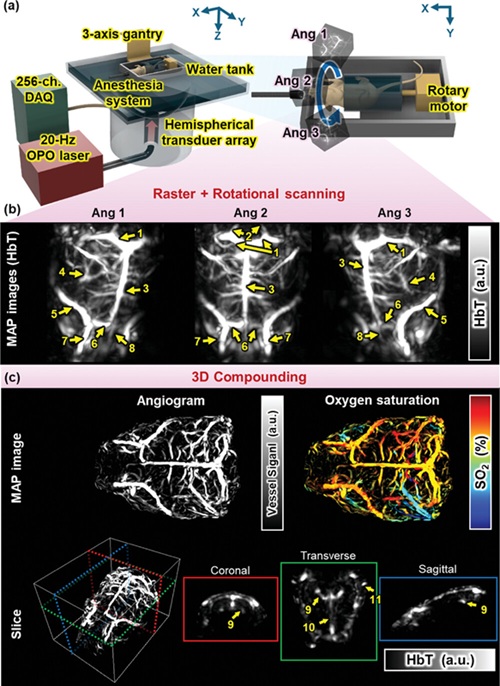Artificial Intelligence Software Cuts Prostate MRI Read Times by 56%
|
By MedImaging International staff writers Posted on 08 May 2023 |

Multiparametric MRI (mpMRI) serves as a noninvasive triage tool that can not only detect clinically significant prostate cancer (csPCa) lesions but also provide information on locoregional staging and biopsy. When combined with serum prostate-specific antigen (PSA) tests, an "MRI diagnosis pathway" may help reduce excessive biopsies and overtreatment of indolent lesions. CAD systems can improve radiologists' diagnostic performance and minimize interpretation inconsistencies. While many studies suggest that AI-based CAD systems have potential clinical utility in csPCa detection, their generalization and performance on outside datasets have not been thoroughly explored.
Now, a study by researchers at Peking University First Hospital (Beijing, China) has found that AI software can decrease false positive reports of csPCa while also reducing radiologist read times. Using proprietary deep learning-based AI software, radiologists were able to halve their read times when interpreting mpMRI scans of patients with suspected prostate cancer, dropping from 423 to 185 seconds per exam. Additionally, the AI software improved sensitivity and specificity. The study's significance lies in the testing method, as it involved 11 different MRI systems from three institutions, demonstrating the software's reproducibility and real-world utility, which has been lacking in previous CAD system studies.
In the study, 480 mpMRI images with 349 csPCa lesions in 180 cases were used. Sixteen radiologists with varying experience levels from four hospitals participated, interpreting scans with and without the software before reinterpreting the same scans four weeks later in switched mode. The software increased sensitivity from 40.1% to 59.0% and specificity from 57.7% to 71.7%. It also reduced reading times by 56.3% and improved diagnostic confidence scores from 3.9 to 4.3. Despite the study's limitations, the researchers believe their results indicate how the AI software could benefit patients and providers in real-world clinical situations.
“The strength of our study is that the external data were collected from three different medical institutions,” the team noted. “The mpMRI images were acquired using a total of 11 different MR devices with some variation in scan parameters. Thus, the data are very heterogeneous, which is a challenging task for AI algorithms.”
Latest Imaging IT News
- New Google Cloud Medical Imaging Suite Makes Imaging Healthcare Data More Accessible
- Global AI in Medical Diagnostics Market to Be Driven by Demand for Image Recognition in Radiology
- AI-Based Mammography Triage Software Helps Dramatically Improve Interpretation Process
- Artificial Intelligence (AI) Program Accurately Predicts Lung Cancer Risk from CT Images
- Image Management Platform Streamlines Treatment Plans
- AI-Based Technology for Ultrasound Image Analysis Receives FDA Approval
- AI Technology for Detecting Breast Cancer Receives CE Mark Approval
- Digital Pathology Software Improves Workflow Efficiency
- Patient-Centric Portal Facilitates Direct Imaging Access
- New Workstation Supports Customer-Driven Imaging Workflow
Channels
Radiography
view channel
Higher Chest X-Ray Usage Catches Lung Cancer Earlier and Improves Survival
Lung cancer continues to be the leading cause of cancer-related deaths worldwide. While advanced technologies like CT scanners play a crucial role in detecting lung cancer, more accessible and affordable... Read more
AI-Powered Mammograms Predict Cardiovascular Risk
The U.S. Centers for Disease Control and Prevention recommends that women in middle age and older undergo a mammogram, which is an X-ray of the breast, every one or two years to screen for breast cancer.... Read moreUltrasound
view channel
Tiny Magnetic Robot Takes 3D Scans from Deep Within Body
Colorectal cancer ranks as one of the leading causes of cancer-related mortality worldwide. However, when detected early, it is highly treatable. Now, a new minimally invasive technique could significantly... Read more
High Resolution Ultrasound Speeds Up Prostate Cancer Diagnosis
Each year, approximately one million prostate cancer biopsies are conducted across Europe, with similar numbers in the USA and around 100,000 in Canada. Most of these biopsies are performed using MRI images... Read more
World's First Wireless, Handheld, Whole-Body Ultrasound with Single PZT Transducer Makes Imaging More Accessible
Ultrasound devices play a vital role in the medical field, routinely used to examine the body's internal tissues and structures. While advancements have steadily improved ultrasound image quality and processing... Read moreNuclear Medicine
view channel
Novel Radiotracer Identifies Biomarker for Triple-Negative Breast Cancer
Triple-negative breast cancer (TNBC), which represents 15-20% of all breast cancer cases, is one of the most aggressive subtypes, with a five-year survival rate of about 40%. Due to its significant heterogeneity... Read more
Innovative PET Imaging Technique to Help Diagnose Neurodegeneration
Neurodegenerative diseases, such as amyotrophic lateral sclerosis (ALS) and Alzheimer’s disease, are often diagnosed only after physical symptoms appear, by which time treatment may no longer be effective.... Read moreGeneral/Advanced Imaging
view channel
AI Model Significantly Enhances Low-Dose CT Capabilities
Lung cancer remains one of the most challenging diseases, making early diagnosis vital for effective treatment. Fortunately, advancements in artificial intelligence (AI) are revolutionizing lung cancer... Read more
Ultra-Low Dose CT Aids Pneumonia Diagnosis in Immunocompromised Patients
Lung infections can be life-threatening for patients with weakened immune systems, making timely diagnosis crucial. While CT scans are considered the gold standard for detecting pneumonia, repeated scans... Read moreImaging IT
view channel
New Google Cloud Medical Imaging Suite Makes Imaging Healthcare Data More Accessible
Medical imaging is a critical tool used to diagnose patients, and there are billions of medical images scanned globally each year. Imaging data accounts for about 90% of all healthcare data1 and, until... Read more
Global AI in Medical Diagnostics Market to Be Driven by Demand for Image Recognition in Radiology
The global artificial intelligence (AI) in medical diagnostics market is expanding with early disease detection being one of its key applications and image recognition becoming a compelling consumer proposition... Read moreIndustry News
view channel
GE HealthCare and NVIDIA Collaboration to Reimagine Diagnostic Imaging
GE HealthCare (Chicago, IL, USA) has entered into a collaboration with NVIDIA (Santa Clara, CA, USA), expanding the existing relationship between the two companies to focus on pioneering innovation in... Read more
Patient-Specific 3D-Printed Phantoms Transform CT Imaging
New research has highlighted how anatomically precise, patient-specific 3D-printed phantoms are proving to be scalable, cost-effective, and efficient tools in the development of new CT scan algorithms... Read more
Siemens and Sectra Collaborate on Enhancing Radiology Workflows
Siemens Healthineers (Forchheim, Germany) and Sectra (Linköping, Sweden) have entered into a collaboration aimed at enhancing radiologists' diagnostic capabilities and, in turn, improving patient care... Read more















![Image: [18F]3F4AP in a human subject after mild incomplete spinal cord injury (Photo courtesy of The Journal of Nuclear Medicine, DOI:10.2967/jnumed.124.268242) Image: [18F]3F4AP in a human subject after mild incomplete spinal cord injury (Photo courtesy of The Journal of Nuclear Medicine, DOI:10.2967/jnumed.124.268242)](https://globetechcdn.com/mobile_medicalimaging/images/stories/articles/article_images/2025-02-24/Brugarolas_F8.large.jpg)



